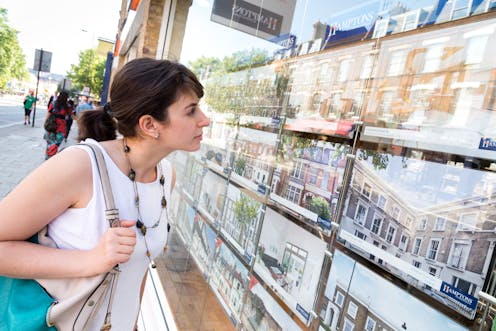What a £350,000 average house price means for first-time buyers in Great Britain
- Written by Colin Jones, Professor of Real Estate, Heriot-Watt University

The average house price in Great Britain has risen above £350,000[1] for the first time, according to property website Rightmove. From 2021 to 2022, house prices in all regions and countries except London and Scotland rose by 10% and are now approaching a level (house price to income ratio) last seen at the height of the economic and housing boom of the 2000s.
As a result, middle-income households are priced out of the market. This is an ongoing phenomenon. The UK government’s statistics show[2] that the proportion of people who owned and lived in their own home peaked at just under 71% in 2003 in England. By 2020, it had fallen to 64%.
In the 2000s, the private-rented sector grew massively, with the rise of buy-to-let landlords[3]. At the same time, there was a large increase[4] in the number of young adults living with their parents. This phenomenon has also continued because both buying and renting have become increasingly unaffordable[5]. Nevertheless, people largely still aspire[6] to own their own homes[7].
The 2020 stamp-duty holiday
Between the 2008 financial crisis and 2020, there were only modest rises in house prices. With real incomes falling[9] and both home ownership and rentals reaching unaffordable levels, the average age of a successful first-time buyer[10] rose from 29 in 2011 to 32 in 2021.
These modest house price increases also meant that existing homeowners took longer to be able to afford to move to a larger house. With little or no rise in the value of property to fund an upgrade and rising costs of moving[11], sales stayed at a low ebb.
This all changed when the UK government introduced a stamp-duty holiday in July 2020 (stamp duty being the tax that has to be paid on property purchases in the UK). The exemption applied to transactions up to a ceiling of £500,000 and it lasted until July 2021, before being reduced and abolished on September 30 2021.
The stamp-duty holiday provided buyers with a brief window of opportunity. House sales rose dramatically, to above the level of the 2000s boom. It effectively unlocked the housing market, but at the cost of the spike in house prices noted above.
The cost of living crisis
On the one hand, this was beneficial, in that it meant more people could afford to buy. That is to say, the number of first-time buyers jumped by 35%[12], with an average house price, according to Halifax, of £264,140 in 2021. This figure represented only a 3% annual increase in the price paid by first-time buyers, compared with 2020.
On the other hand, more than half of those first-time buyers needed financial support from their families and a joint salary for a couple of £70,000. There was no noticeable increase in private housebuilding, compared with pre-pandemic times. And the rise in house prices went mainly into the pockets of existing homeowners, more than half of whom had paid off their mortgages.
With the end of the tax holiday, it is now back to reality. As the remnants of this state-engineered, artificial mini-boom drift away, the cost of living crisis is gripping the nation. The housing market is bound to be affected[14]. Home ownership is likely to be out of reach for more and more people.
The obvious solution – to substantially build more houses – remains elusive. The government has stated that we need to build 300,000 homes a year in the UK, but the highest figure since the millennium has been only 216,00, in 2007-08. It is now an unlikely aspiration for the middle of this decade.
Of course, it is not just about the absolute number of houses built but whether people can afford to buy them. The UK government has broken its promise to build more affordable housing. Private housebuilders need to rediscover what it means to build for low- and middle-income households.
References
- ^ risen above £350,000 (www.rightmove.co.uk)
- ^ UK government’s statistics show (www.gov.uk)
- ^ buy-to-let landlords (www.tandfonline.com)
- ^ large increase (www.ons.gov.uk)
- ^ increasingly unaffordable (www.jrf.org.uk)
- ^ aspire (theconversation.com)
- ^ own their own homes (committees.parliament.uk)
- ^ Andrey_Popov | Shutterstock (www.shutterstock.com)
- ^ real incomes falling (www.ons.gov.uk)
- ^ first-time buyer (www.lloydsbankinggroup.com)
- ^ rising costs of moving (www.financialreporter.co.uk)
- ^ jumped by 35% (www.moneyage.co.uk)
- ^ Monkey Business Images | Shutterstock (www.shutterstock.com)
- ^ affected (theconversation.com)
- ^ This article is part of Quarter Life (theconversation.com)
- ^ Prioritising home ownership hurts everyone – owners as well as renters (theconversation.com)
- ^ Affordable housing is a myth that worsens the housing crisis – but there is a fix (theconversation.com)
- ^ Entire home Airbnb listings in London have increased by 571% in 5 years: new research (theconversation.com)







